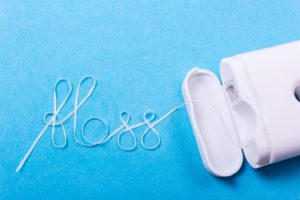
Do you floss every day?
Most people have gotten their brushing routine down. They brush in the morning and before they go to bed. Some even brush after every meal. But the majority of people are still not regular flossers. Using an interdental cleaner, such as floss, is an absolutely essential part of a good oral hygiene routine. Brushing without getting in between your teeth means that you are leaving a good percentage of food particles and bacteria in your mouth. Yes, you should floss every day! For many people flossing is at the very bottom of their priority list. It can seem cumbersome, and many see it as unnecessary. “If I’m brushing my teeth, what’s the big deal about flossing?” Unfortunately, while brushing is a good start, it can still leave behind plaque and bacteria. Dentists don’t just recommend, but strongly urge, patients to make flossing an important, consistent part of their daily routine because of the key role it plays in maintaining gum health, an essential part of a beautiful smile.
Ever Thought About What You’re Missing by Brushing Alone?
When you choose not to floss, you are missing approximately 40% of your teeth’s surface. This means, that over time, you are far more likely to struggle with tooth decay as a result of acidic tartar buildup. Unfortunately, it also means that you are more likely to develop gum disease, since plaque on the surface of the teeth can lead to irritation and even infection of the gum tissue.
Brushing your teeth twice a day is an important way to prevent dental cavities. Unfortunately, brushing alone is usually not sufficient for keeping tartar buildup at bay. That is why dentists so strongly urge patients to floss every day, as well. Flossing can help to remove the bacteria and food particles that can lodge between teeth, where bristles cannot reach. Plus, it’s a fast and affordable way to protect both the teeth and gums. So, if you are not yet flossing daily, there are compelling reasons that you really should start.
Gum disease is a chronic condition, and the leading cause of adult tooth loss. Preventing it is incredibly important to protecting your oral health. That is why gum care, like flossing every day, is so essential.
The purpose of flossing every day
- Even persistent brushing is unable to remove all the plaque and bacteria that can gather between teeth. Mouthwashes also leave behind hard-to-reach germs.
- Flossing is often the best way to remove the bacteria prone to gather in between teeth, and it can be an important measure in maintaining gum health.
- When bacteria and food particles remains in the mouth, particularly between teeth, it can cause gum inflammation that can lead to periodontal disease if untreated. That’s why dentists are so adamant about the importance of flossing. It should not be seen as an alternative or “bonus” after brushing, but as a separate and equally important part of at-home dental care.
A Simple Way to Protect Your Smile is to floss every day
Flossing should be simple and pain-free. In fact, if you are experiencing any discomfort, much less noticing bleeding when you floss, it could be a symptom of gingivitis, the first stage of gum disease.
A preventive dental cleaning could help to remove tartar buildup. That said, in some cases more extensive periodontal care might be needed to truly restore the smile.
Skipping just one day of flossing can let bacteria thrive
Brushing really only cleans the surface of the teeth. If the interdental area between teeth is not cleaned, it can lead to bad breath and/or gingivitis. Gingivitis is a mild form of gum disease, where the gums become red and inflamed. Leftover food particles can lead to plaque buildup, which can lead to irritation to the gums. If gum inflammation goes unchecked, it can weaken the gums to the point of tooth loss.
There is a right way to floss
It is ineffective to just floss back and forth in between teeth. To efficiently clean between teeth, you should curl the floss around each tooth in a C-shape. Slide up and down each tooth and gently below the gumline. To prevent moving bacteria from one tooth to the next, move to a clean piece of floss for each tooth.
Flossing every day is an important part of a good oral hygiene routine
Dr. Fondriest can help you create a good dental hygiene routine including brushing and flossing. Lake Forest Dental Arts proudly serve patients from Chicago and all surrounding communities. To schedule a consultation, call our office in Lake Forest, IL, today at 847-234-0517.
